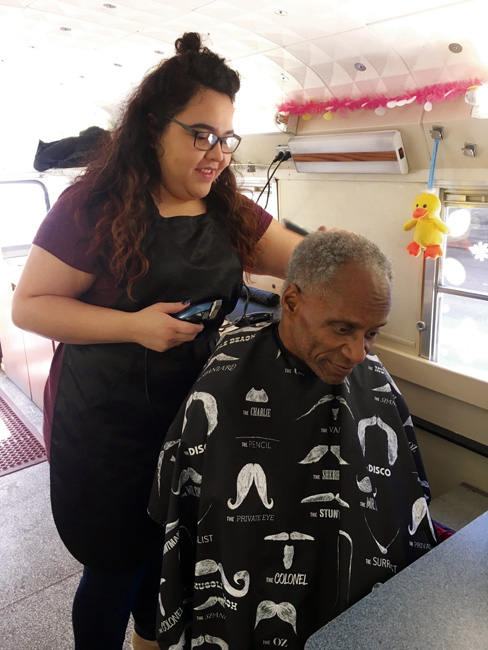When we see people holding up signs on street corners, hoping for a donation, we don’t want to catch their eyes as we wait for the light to change and we can get away. We don’t know their names, and we hardly know their stories, the “why” of their placement on the street.
If you ever get a chance to go on the St. Vincent de Paul Mobile Kitchen, a.k.a., the soup bus, don’t pass it up. Then you might meet Tom, or Eddie or the ladies who are also grateful for the opportunity to warm up in the winter or cool down in the summer for a few minutes with people who don’t look at them like pariahs or less human than others.
It’s actually a gift to be able to meet them, talk to them and serve them. They’re just like we who have homes, possibly jobs, and what might pass for a normal life compared to theirs. They’re just “down” on their luck, they might say. For some reason, they have been tossed aside by others; they might have a drug or alcohol problem or be marginally mentally disabled. For whatever reason, they find themselves boarding the bus for a meal.
Operated by the St. Vincent de Paul Society, the “breakfast bus” parks under an overpass in St. Louis once a month to serve breakfast. Guided by Vincentian, Gerry Hasenstab, I am lucky to be part of the crew once in awhile. And several times a year, Gerry invites Stephanie Avalos and her friend, Bianca Pacheco — hairstylists — to come along in a second bus to offer free haircuts to those who would like one. Stephanie’s fiancé, Jay Pacheco helps serve on the breakfast bus. Before she assembles her stylist tools, she collects hygiene products for the clients she meets on the bus.
Leaving the bus after a haircut, carrying a gift bag from Stephanie, the people seem to walk a little taller, have a bit of a spring in their steps. They not only feel better, they look better too. And they know it. While these are not people God has cast aside, many of us may not be as welcoming as those who staff the buses. These rotating crews say a prayer before they begin serving breakfast or cutting hair.
Those of us who want to be part of the crew on these buses, both those that roll out during the days of the week and on some Sundays, know we are here to serve everyone, not just the people we choose. Anyone who approaches the door of the bus is invited to “come aboard” for breakfast or for sandwiches in the evening.
We have no idea what has happened to them, how they came to be on the street or on the bus. If they feel we are not judging them — and we most certainly are not — they might tell us their stories, how they came here from Ohio and slept in a car for awhile or what frightens them so much that they feel uncomfortable staying in a shelter.
The next time you see someone on a street corner with a sign, please say a prayer for them instead of wishing they would just go away.







